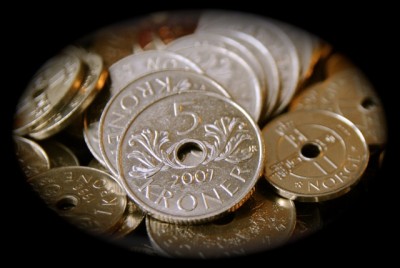UPDATED: Norway’s currency, the krone, continued to weaken on Wednesday after the price of a barrel of Norway’s North Sea crude oil dipped below USD 47 on Tuesday. By midday Wednesday, it cost just over NOK 13 to buy one British pound, while a US dollar cost NOK 8.50, up from NOK 8.08 just a few days ago.

The krone also fell against the euro, which cost NOK 9.40 on Wednesday. It was the first time in years that a British pound was so strong against the krone, at NOK 13.003.
Currency analysts said it was just a matter of time before the once very strong krone strengthens again, but in the meantime, it’s falling towards record low levels.
“When we raise our heads and look at the bigger picture, the krone is considerably weaker than what the fundamentals of the Norwegian economy should suggest,” Magne Østnor, currency strategist at DNB Markets, told newspaper Dagens Næringsliv (DN).
His firm, tied to Norway’s biggest bank, DNB, expects a stronger krone, but not before it may cost as much as NOK 9.70 for a euro shortly after New Year. That would be a level hardly seen since the euro was introduced, except for during a brief period around New Year of 2008-2009, when the finance crisis was sparking great market uncertainty.
On Tuesday the krone fell by 15 øre against all major currencies. Østnor blamed it on “the effect of lower oil prices in recent days.” Given the tumble from well above USD 50 to USD 46.68 at one point on Tuesday, Østnor said he was actually surprised the krone didn’t fall more. It continued to tumble on Wednesday, though, just as Norway’s biggest company, Statoil, was announcing a profit dive and unemployment figures were edging upwards.
There’s also speculation that interest rates may fall again, when the board of Norway’s central bank meets in December. That would further weaken the krone, but that’s what the central bank and many economists want right now. The weaker krone, which traded at just around NOK 6 against the dollar early last year, can help revive Norway’s economy by making exports less expensive and more competitive. Norway’s tourist industry, the huge salmon and seafood business and a host of other exporters are delighted by the weak krone after so many years of record strength. They’re suddenly attracting more visitors and buyers from abroad.
If oil prices rise, however, the krone will strengthen because the Norwegian economy is still so dependent on the country’s oil industry. That could be good news to oil and offshore firms, currently stuck in the biggest economic slowdown in years.
newsinenglish.no/Nina Berglund

